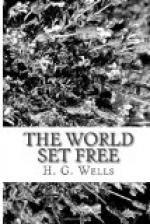He met a man named Lawson, an old school-fellow, of whom history now knows only that he was red-faced and had a terrier. He and Holsten walked together and Holsten was sufficiently pale and jumpy for Lawson to tell him he overworked and needed a holiday. They sat down at a little table outside the County Council house of Golders Hill Park and sent one of the waiters to the Bull and Bush for a couple of bottles of beer, no doubt at Lawson’s suggestion. The beer warmed Holsten’s rather dehumanised system. He began to tell Lawson as clearly as he could to what his great discovery amounted. Lawson feigned attention, but indeed he had neither the knowledge nor the imagination to understand. ’In the end, before many years are out, this must eventually change war, transit, lighting, building, and every sort of manufacture, even agriculture, every material human concern——’
Then Holsten stopped short. Lawson had leapt to his feet. ’Damn that dog!’ cried Lawson. ’Look at it now. Hi! Here! Phewoo—phewoo phewoo! Come here, Bobs! Come here!’
The young scientific man, with his bandaged hand, sat at the green table, too tired to convey the wonder of the thing he had sought so long, his friend whistled and bawled for his dog, and the Sunday people drifted about them through the spring sunshine. For a moment or so Holsten stared at Lawson in astonishment, for he had been too intent upon what he had been saying to realise how little Lawson had attended.
Then he remarked, ‘well!’ and smiled faintly, and—finished the tankard of beer before him.
Lawson sat down again. ‘One must look after one’s dog,’ he said, with a note of apology. ‘What was it you were telling me?’
Section 2
In the evening Holsten went out again. He walked to Saint Paul’s Cathedral, and stood for a time near the door listening to the evening service. The candles upon the altar reminded him in some odd way of the fireflies at Fiesole. Then he walked back through the evening lights to Westminster. He was oppressed, he was indeed scared, by his sense of the immense consequences of his discovery. He had a vague idea that night that he ought not to publish his results, that they were premature, that some secret association of wise men should take care of his work and hand it on from generation to generation until the world was riper for its practical application. He felt that nobody in all the thousands of people he passed had really awakened to the fact of change, they trusted the world for what it was, not to alter too rapidly, to respect their trusts, their assurances, their habits, their little accustomed traffics and hard-won positions.




